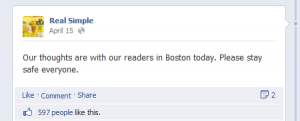When Tragedy Strikes, How Does Social Media Respond?
On April 15th, I learned of the Boston Marathon bombings through Facebook. My feed was immediately filled with links to major news organizations and status updates from the Boston Police Department. But I also scanned through a number of Facebook comments that were angry for another reason: Upset individuals decried pages that continued to post contests, travel tips or recipes while the city of Boston held its breath.
Granted, many businesses have a social media schedule that allows their pages and profiles to run in an automated fashion, thus giving the appearance that they were ignoring the incident. But I repeatedly opened business and community pages that, despite having posted their condolences shortly after the bombing, were still being called “heartless” and “tasteless” for continuing their regularly scheduled posts.
 Take Real Simple, which wished the best for its Boston readers shortly after the incident and then continued to post its usual cooking, fashion and cleaning tips. Their oatmeal recipe that afternoon garnered 24 responses, one of which called for the magazine to end its “nonsensical posts given what’s happened in Boston.” I saw many people call out that poster, saying that they were glad to see something other than bad news and frightening photos in their feed.
Take Real Simple, which wished the best for its Boston readers shortly after the incident and then continued to post its usual cooking, fashion and cleaning tips. Their oatmeal recipe that afternoon garnered 24 responses, one of which called for the magazine to end its “nonsensical posts given what’s happened in Boston.” I saw many people call out that poster, saying that they were glad to see something other than bad news and frightening photos in their feed.
A few hours later, the magazine asked readers about their fashion challenges. While the majority of the 300+ responses were related to the topic at hand, there were also a few “I just unliked you” comments along with these dissatisfied posts:
- “People are fighting for their lives in Boston, and this is what Real Simple chooses to post?”
- “How could you post something so unimportant on such a tragic day for some of your followers? DISLIKE!”
For each disapproving post, there were two others who thanked the magazine for continuing its usual content. But I still wondered if there were a posting protocol in these situations.
That evening, I made my first Facebook status about the bombing by proposing this question: “A tragedy occurred in the US today. Many businesses in my feed published their condolences, and then kept on with their usual posting pattern on Facebook. Do you think it’s inconsiderate for a business on social media to keep posting about its product when something bad like today’s bombing occurs?” I later shared the same question with seven of my EVG colleagues (named below) and discovered three themes.
1] Questionable Motives
One Facebook friend wondered if businesses posting in the midst of a major tragedy were hoping to snag the traffic, while Sarah Hamilton felt that “condolences and the same old glib advertising make it come across as more disingenuous. It drives home that companies are only there to make money and it dehumanizes them.” Three coworkers chimed in that a business should never take advantage of a terrible event, such as by posting an unprecedented sale. One person gave an example of an NYC business that posted a “storm sale” on Facebook during Hurricane Katrina, a poor choice that inspired her “unliking” the page.
Lesson: Timing is everything. Consider how different updates throughout the day will reach your community, rather than posting in the moment.
2] Silence May Say the Wrong Thing
On the other hand, failure to respond could reflect poorly on your company, giving customers the impression that you are unaware of major events or uncaring. I agree with Bobbie Kessler that a business’s “lack of response makes it seem as if they are so tied up in not missing an opportunity to make more money.”
Lesson: If your audience responds to a major event, then acknowledge it as well and connect with your followers. Aim to be a community member, not just a business page.
3] Post Away, but with Caution
Most of my Facebook friends and coworkers agreed on at least this: while it’s better to acknowledge a national tragedy rather than ignore it, your social media presence does not have to fall silent once bad news hits the headlines. As Faith Jones pointed out, “I can’t remember when any tragedy in my lifetime caused all TV channels to cancel their regular programming as a result of or in respect for a tragedy.” This aligned with my belief that we do not expect brick-and-mortar stores to lock their doors or billboard owners to rip down ads when tragedies occur, so why do we expect this of their online counterparts? A post resembling normalcy can provide a comforting break from the horror outside and remind readers of the good times that persevere after a bad experience.
Kristen Staples aptly summed up the majority opinion: “I don’t think it’s necessary for a business to post an acknowledgement of a tragedy on their social media, as people usually ‘follow’ particular businesses for specific information relevant to an industry, as opposed to collective opinions on other matters. However, I don’t think it’s bad for a company to do it; I just don’t think they’re obligated.”
Lesson: If you post your usual content, then be hyperaware of your followers’ responses and ready to change your posting schedule, if necessary.
Aside from this ABC News article, a great deal has been said about how social media helped/hurt the investigation and almost nothing has been said about the etiquette businesses should follow in these situations. While I believe the above lessons make an excellent starting point for how to respond to tragedy, is there another approach social media managers might use? How did you handle that day’s events?
Harvin Bedenbaugh – Editor




